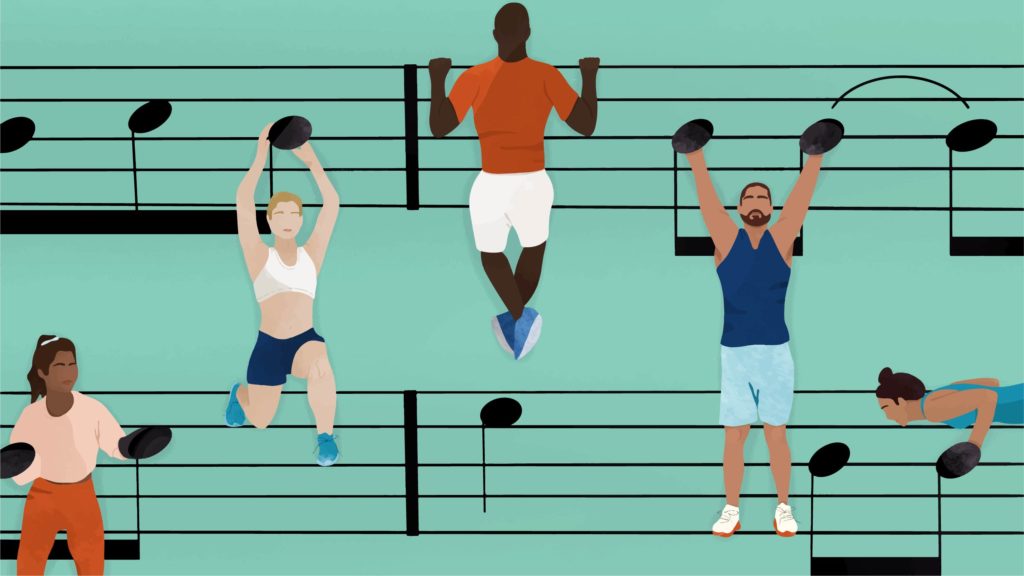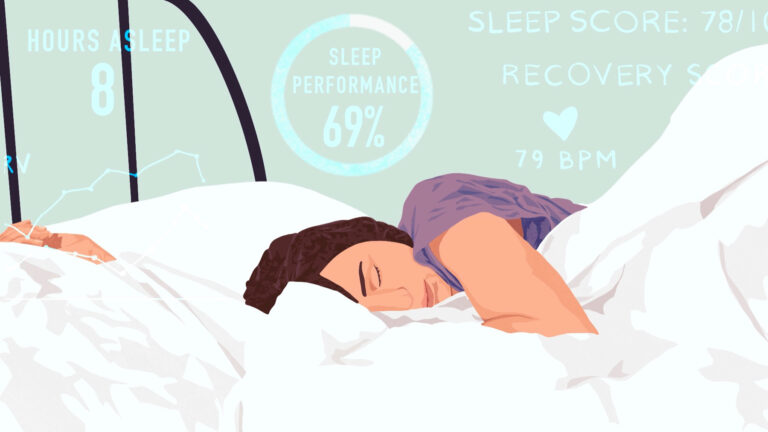Fitness and music go hand in hand. But now, these billion-dollar industries are converging like never before.
While musicians and publishers look to capitalize on the digital fitness boom, fitness brands are busy navigating copyrights and enlisting A-list artists.
As music becomes inseparable from the modern-day fitness business, fitness companies will become media platforms in their own right.
In The Zone
The right playlist can make or break a workout.
Equal parts motivation, entertainment, and science, research shows that music can improve athletic performance — affecting heart rate, respiratory rate, and brain activity.
The impact is so profound that Dr. Costas Karageorghis, professor of sport & exercise psychology at Brunel University in London, said: “music can be like a performance-enhancing drug.”
Nothing new, music has long been an essential accompaniment to exercise. Except now, the soundtrack is vertically integrated into the fitness stack, creating a growing list of challenges and opportunities.
Remix
Music’s role in the fitness industry has evolved over time.
Prior to the current era of connected fitness, instructors doubled as DJs, expertly (or not so deftly) curating playlists for class. As boutique studios and fitness apps gained popularity, the landscape started to shift.
In 2018, SoulCycle unveiled a media division. Seeking to diversify beyond the studio, the company rolled out initiatives like SoulCycle Radio on SiriusXM, Retreats by SoulCycle, and the Sound by SoulCycle concert series.
The right idea but wrong execution, SoulCycle didn’t introduce digital or hardware offerings until last spring.
Also in 2018, music licensing company Rumblefish inked a deal with ClassPass to support content in its app. And audio-guided workout provider Aaptiv closed its Series C, with Warner Music Group and Bose investing in the round.
A sign of things to come, Peloton acquired Neurotic Media, a B2B music aggregator, in June of the same year.
Turn It Up
Connected equipment—and Peloton, in particular—helped make music central to the future of fitness. But not without a few snags along the way.
In 2019, ahead of its public offering, Peloton warned of music-related risk. In its S-1 filing, the company said:
“We cannot compel third parties to license their music to us, and our business may be adversely affected if our access to music is limited. The concentration of control of content by major music licensors means that the actions of one or a few licensors may adversely affect our ability to provide our service.”
Peloton also noted the complexity of music licensing agreements, writing:
“We cannot assure you that we are not infringing or violating any third-party intellectual property rights…”
They were right. In fact, the company was in the midst of a $300M lawsuit brought by the National Music Publishers’ Association. Ultimately, the suit was settled for an estimated $49M. But not before Peloton members expressed their dissatisfaction with the fix.
Consumer backlash aside, the lawsuit signaled the music industry’s seriousness around licensing and the costliness of acquiring the appropriate rights.
Music to Their Ears
Representing a lucrative new revenue stream, the rise of live and on-demand fitness content is music to the ears of artists, publishers, and labels.
Between 2000 and 2014, record sales dropped more than 40%. But, bolstered by the rise of streaming, the industry posted a compound annual growth rate of 13% between 2015 and 2019, reaching $11.1B. Of note, streaming accounted for 80% of industry revenues in 2019.
Thanks in part to the growth of fitness platforms like Peloton, alongside streaming services, social media companies, and video games, Goldman Sachs expects music industry revenues to reach $142B in 2030.
The recent flurry of activity speaks to the potential:
- Peloton partnered with Beyoncé for exclusive content.
- iFit teamed with Feed.fm to improve its music offering.
- Equinox Media licensed Universal Music Group’s catalog.
- Echelon announced a fully licensed music offering via MediaNet.
- VR fitness company Supernatural did deals with Warner and Universal.
According to the Wall Street Journal, digital fitness already represents hundreds of millions of dollars to labels and publishers. Soon, Universal expects the leading fitness platforms to be among its top revenue generators, alongside the likes of Spotify and Apple Music.
Opening Act
For fitness companies, creating compelling workout content set to hit music is table stakes. As time goes on, the ability to secure licenses and team with popular artists will become a competitive advantage.
Meanwhile, as digital fitness becomes a profit center for the music industry, companies like Peloton will evolve their content strategy.
Working directly with artists, the Peloton x Beyoncé deal is likely the first of many music-related partnerships. In fact, Peloton’s Artist Series has already seen success. And the company has begun experimenting with original music too, releasing exclusive Elvis remixes.
Seizing on these synergies, artists have begun investing in the connected fitness space. Pitbull and Jay-Z are both investors in CLMBR, where they’ll certainly leverage their clout and content.
Beyond fitness, we’ve seen this strategy play out at Calm. Musical artist Harry Styles, an early investor in the company, literally crashed the app when his Sleep Story was released on the platform.
Looking Ahead
In the near term, the quest for differentiated content and cost controls will lead to greater verticalization of music within the fitness stack.
As Peloton CEO John Foley has said, he’s building “a media company akin to a Netflix”—meaning heavy spending on original content is inevitable. And “Peloton Music” isn’t out of the question.
This fact will create substantial moats for deep-pocketed category leaders like Peloton and Equinox while causing headaches for independent fitness creators and upstart brands who don’t have an unlimited budget.
Further on, AI-generated music could reshape the landscape once again, creating highly personalized, activity-specific playlists. For now, Amazon-backed Endel, AI streaming app Mubert, and OpenAI’s Jukebox are just scratching the surface of what’s possible.
🎙 On The Podcast
This week, on the Fitt Insider podcast, we’re joined by Harpreet Singh Rai, CEO of Oura — makers of a health-tracking smart ring.
In this episode, we discuss:
- How wearables went from step counting to health monitoring
- The importance of providing accurate, actionable data
- Evolving the business models, including subscriptions and payments
- Why competition from Apple, Amazon, and Google is a good thing
Listen to the full episode here.
For more, read our deep dive on Oura: The Next Billion-Dollar Wearable
💸 SPAC Central
Beachbody is going public in a $2.9B SPAC deal with smart bike maker MYXfitness and blank-check company Forest Road Acquisition Corp.
For context: In Issue No. 110, The SPACs are Coming, we pointed out the potential for special purpose acquisition companies across the health and fitness space. Beachbody is the first of more mergers to come.
Need to know: Despite catching flack for its MLM model, a topic Beachbody CEO Carl Daikeler defended on the Fitt Insider podcast, the company had been around for more than 20 years.
With fitness franchises like P90X and INSANITY, Beachbody has amassed 2.6M paying subscribers. Over the years, the company has evolved from VHS tapes and DVDs to streaming content.
Part of the deal is Beachbody-owned Openfit, a streaming fitness platform meant to reach a new audience separate and apart from the Beachbody brand. Last year, Openfit acquired Ladder, a supplement company started by LeBron James and Arnold Schwarzenegger.
Of note, the Forest Road SPAC is led by former Disney and TikTok exec Kevin Mayer, bringing vast media, technology, and content experience to the space.
The Trifecta. By acquiring MYXfitness, Beachbody will try to bring content, hardware, and nutrition together under its banner.
The hope? Appealing to consumers—beyond aspiring athletes or fans of boutique fitness—who are looking for a more accessible and affordable connected fitness option.
🦄 Unicorn Club
From mental health to digital workouts, recent months have seen a surge of funding activity across fitness and wellness.
Looking closer, the latest batch of billion-dollar companies represents a new wave of opportunity.
Virtual workouts. With $450M in new funding, Zwift earned a billion-dollar valuation last spring. And Keep, China’s most popular fitness app, crossed the mark in January, adding $360M. Next up, Tonal is likely the next fitness unicorn.
Preparing for and recovering from workouts is also big business, with WHOOP entering the billion-dollar club as Hyperice and Oura look to punch their ticket.
Digital PT. Valued at $3B, Hinge Health recently added $300M in funding for its online physical therapy clinic. A massive market, the US healthcare system spends roughly $190B per year to treat muscular and skeletal disorders.
Mental health. On the consumer side, Calm is now valued north of $2B. But enterprise-focused mental health platforms are proving to be a bigger business. Just ask Lyra Health ($2.3B) and Modern Health ($1.17B), the latest mental health unicorns. In related news, Talkspace is preparing to go public in a $1.4B SPAC merger.
Metabolic health. Dedicated to reversing type 2 diabetes without medications or surgery, Virta Health was valued at $1.1B after its latest funding round. A category that’s attracting a growing number of upstarts, Levels recently added $12M to target metabolic health through continuous glucose monitoring.
TBD: The hope, of course, is that these investment dollars and booming valuations democratize access to well-being. Going forward, the challenge is bringing that vision to life.
📰 News & Notes
- Apple CEO Tim Cook pivots to fitness.
- Fitbit adds in-app blood glucose tracking.
- Target’s activewear brand hits $1B in sales.
- Life Time’s CEO is leading virtual cycling classes.
- Facebook to release a health-tracking smartwatch.
- CrossFit new CEO: 1,000 affiliates have returned. [Reread: Can CrossFit Be Saved?]
💰 Money Moves
- Modern Health closed $74M in funding at a $1.17B valuation for its mental health platform.
More from Fitt Insider: We’ve Reached Peak Burnout - Dexcom, the continuous glucose monitoring company, is launching a venture capital fund.
- Chobani is eyeing a 2021 IPO that could value the yogurt maker at $10B.
More from Fitt Insider: How Chobani CEO Hamdi Ulukaya became a self-made billionaire. - Win Brands Group, a holding company for consumer brands, acquired weighted blanket maker Gravity Brand Holdings LLC. Win also announced $50M in new funding to make additional acquisitions.
- Brain stimulation company Flow Neuroscience acquired Halo Neuroscience to focus on the treatment of mental health conditions. Terms were not disclosed.
- Continuing its fitness industry roll-up, TSG acquired Adaptive Analytics LLC., a data analytics solution for health and fitness businesses. An Advent portfolio company, TSG previously acquired TrueCoach, Mariana Tek, zingfit, and Triib.
- Seed Health, a microbial sciences company, acquired digital digestive health upstart auggi.
- Mate Fertility, operators of tech-enabled fertility clinics, closed a $2.8M funding round.
- Equip secured $13M in Series A funding for its virtual eating disorder treatment program.
- Daybreak Health, an online counseling platform for teens, closed a $1.8M seed round.
- Wellness franchisor WellBiz Brands acquired the franchise rights for Drybar’s blowout shops.
- Zocdoc, a digital healthcare marketplace, raised $150M in growth financing from Francisco Partners.
- Redefine Meat, producers of 3D-printed meat alternatives, raised $29M in Series A funding.






